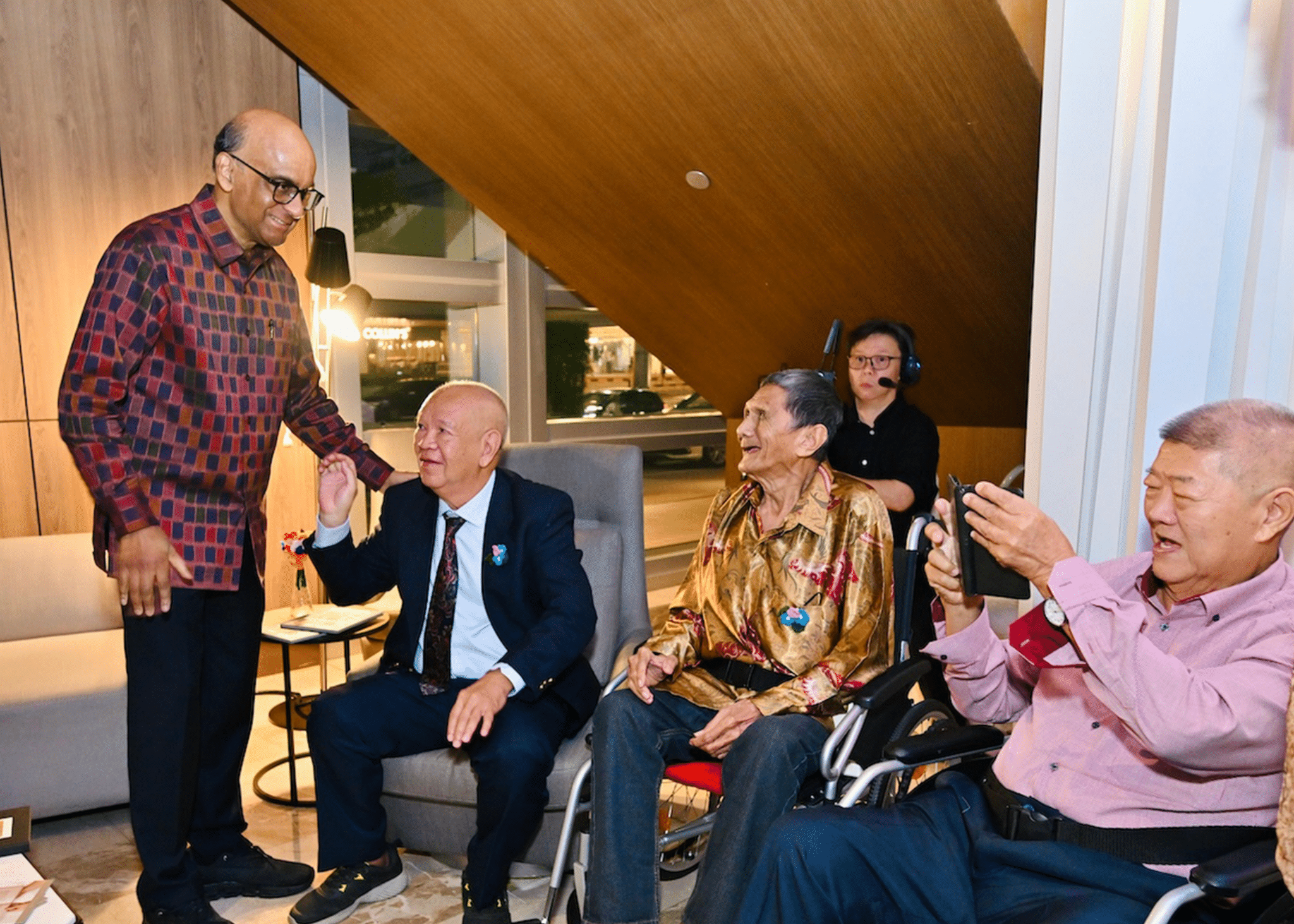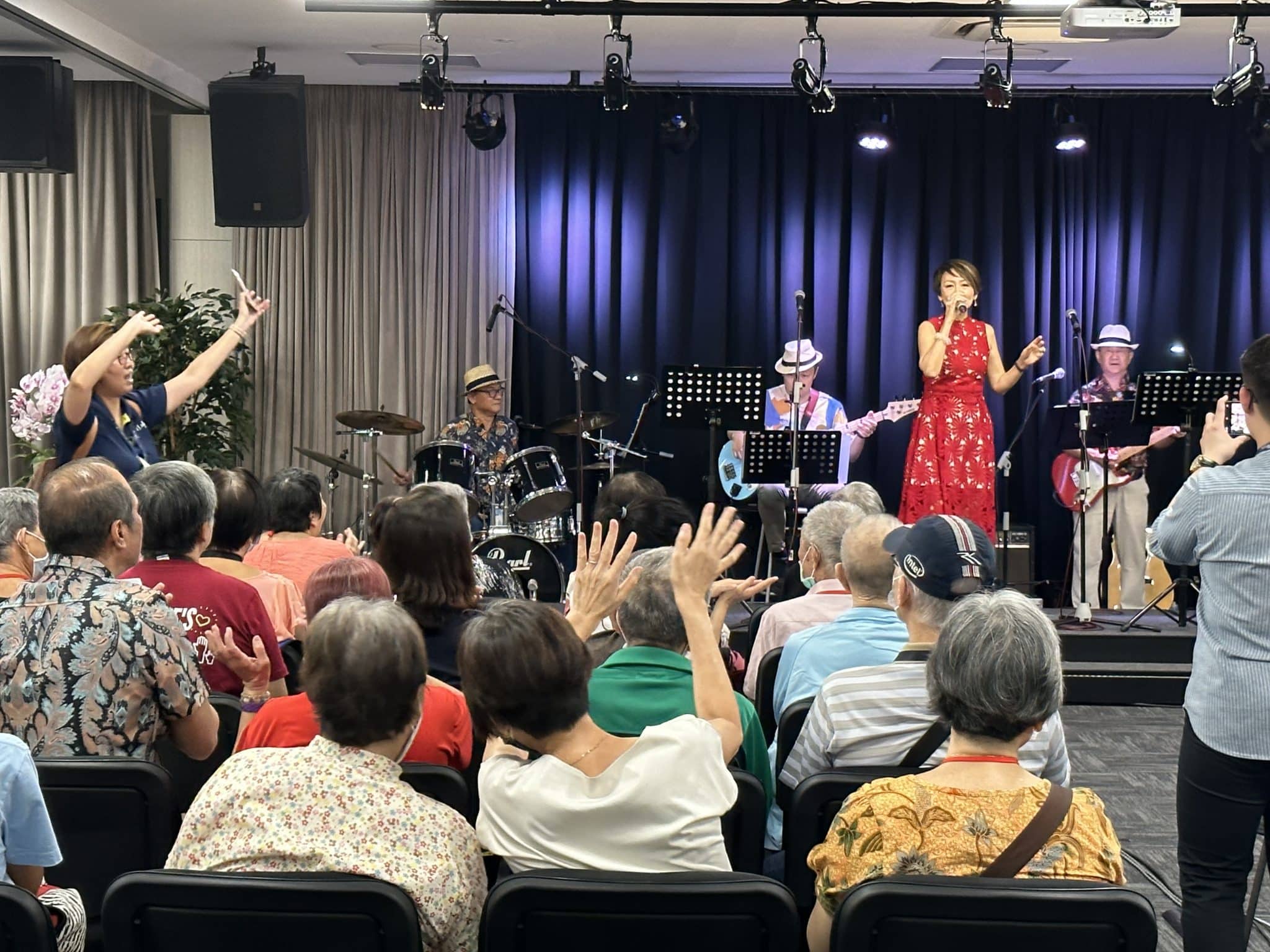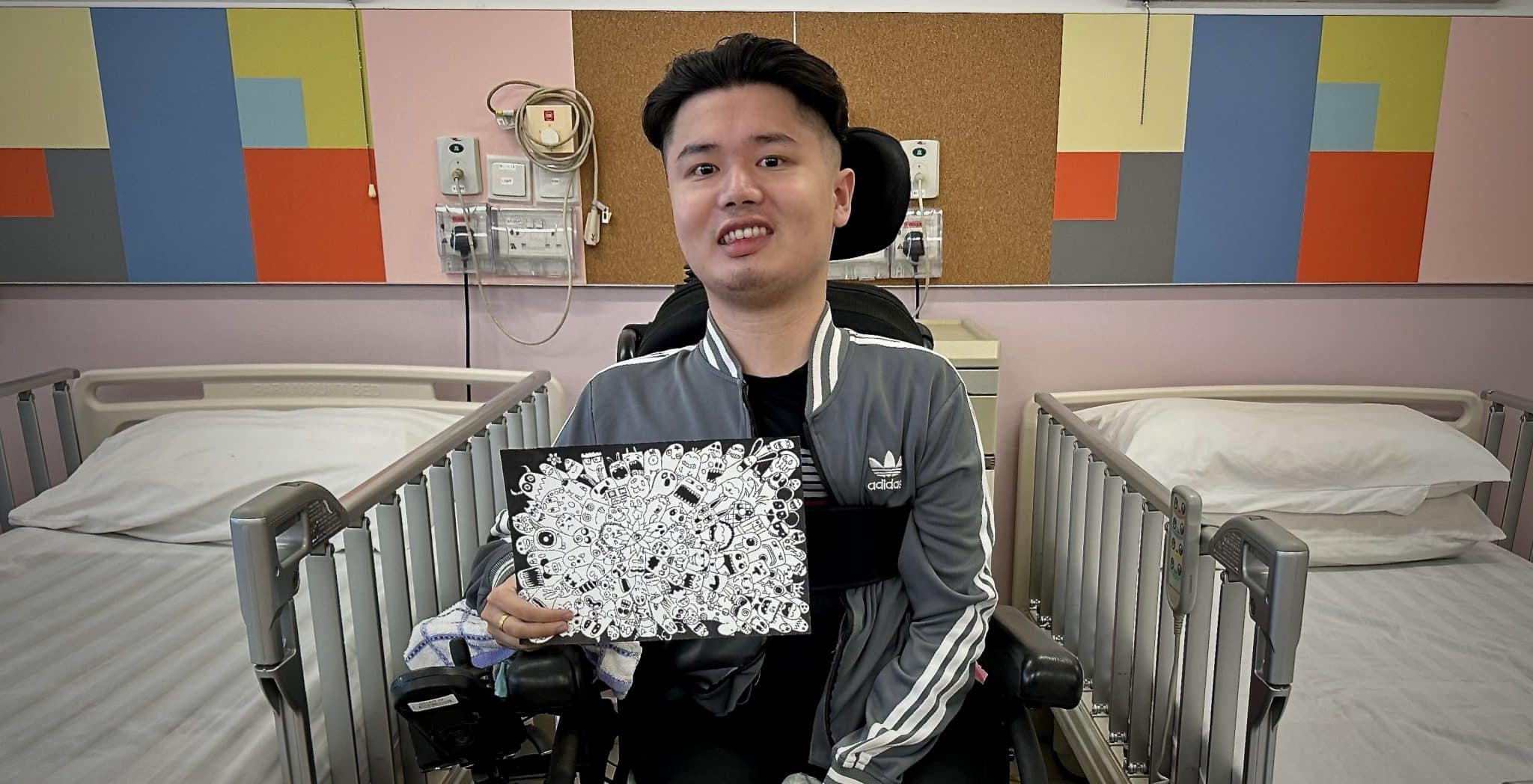Transforming community care: St Luke’s ElderCare to raise $30 million to benefit 45,000 elders in next five years
Salt&Light // November 8, 2024, 5:35 pm

At SLEC's 25th anniversary gala dinner on November 7, 2024, President Tharman Shanmugaratnam met a few elders who participated in SLEC's Golden Memories programme, where generative AI was used to transform their life stories into personalised media formats such as books, audiobooks and AI-generated videos. All photos courtesy of St Luke's ElderCare.
St Luke’s ElderCare (SLEC) aims to raise $30 million over the next five years to benefit more than 45,000 elders – more than three times the number of elders it currently serves across 31 locations.
The Christian healthcare provider is dedicated to serving the community regardless of race, language and religion.
“We have CHRIST’s values of Compassion, Holistic Excellence, Respect, Integrity, Stewardship and Teamwork as the anchors for our next lap of growth.”
The $30 million Community Transformation Fund (CTF) will also help SLEC realise its vision of transforming community care. Such efforts are needed to meet the increasing needs of Singapore’s ageing population.
In two years’ time, by 2026, Singapore will be a “super-aged” society with more than one in five Singaporeans aged 65 and above. By 2030, this figure will be one in four, comprising about one million elders.
SLEC’s plans were announced at its 25th Anniversary Gala Dinner, held last night (November 7, 2024) at Pan Pacific Singapore.
Professor Ho Yew Kee, Chairman of SLEC’s Board of Directors said in his keynote address: “Tonight’s theme is ‘Priceless’. In an impersonable and fast-moving world, human connections are priceless. At SLEC, we treasure each individual as a precious pearl.”
He took the audience through a brief history of the organisation, tracing its roots back to 1999, when St Luke’s Hospital needed continuing care for its patients and SLEC was set up.
“SLEC has experienced God’s grace over the years. We’ve experienced unexpected provision, unprecedented expansion, and moving forward, we have an unstoppable mission,” he said.

President Tharman with SLEC Chairman Prof Ho (right) and Vice Chair Foong Daw Ching lighting up “pearls” to launch the SLEC Community Transformation Fund
President Tharman Shanmugaratnam, the Guest of Honour, said: “St Luke’s ElderCare shows the way in community care, which is an essential pillar in how we support Singaporeans as they live longer and healthier lives.
“It is a model of how community organisations can collaborate with government, healthcare providers, corporations and academic institutions to provide quality care, near the home.”
6 areas of impact
The $30 million fund, benefitting more than 45,000 elders in the next five years, will be used to support initiatives in six areas. These are denoted by the acronym IMPACT:
1. Innovate
To improve accessibility and quality of care for elders, and boost operational efficiency and productivity, SLEC will adopt innovative and advanced technology and research approaches, including:
To improve accessibility and quality of care for elders, SLEC will adopt innovative and advanced technology and research approaches.
• Cutting-edge robotics rehabilitation equipment to help elders regain and maximise their abilities to perform activities of daily living independently. SLEC has invested over $1.5 million in advanced robotics equipment, enabling them to facilitate about 2,100 sessions each month. This is currently present at three of their centres (Bukit Batok Central, Northshore in Punggol, Salem in Yishun) and they want to bring this to more centres in the future.
• Revamp of their Active Ageing Centres (Care) to become thematic Specialty Hubs for Active and Purposeful Engagement (SHAPE). These hubs will each have a specialty – from aquatics and cycling to culinary arts, creative arts (eg painting and pottery) and performing arts – to cater to the diverse interests of their active agers.

SLEC Chairman Prof Ho Yew Kee with President Tharman Shanmugaratnam, SLEC CEO Dr Kenny Tan, SLEC Vice Chairman Foong Daw Ching at a booth featuring books sold to raise funds for SLEC.
• Refreshed designs of their centres to offer spaces that are both functional and aesthetically pleasing, creating a senior-friendly and welcoming environment. They currently have five centres (in Bukit Batok Central, Bukit Timah, Changkat, Telok Blangah and Whampoa), with at least six more in the pipeline.
• Continual refining of their award-winning, demand-responsive transport management system. This is for efficient route-planning, scheduling, and ensuring safety of about 2,000 elders across about 40 vehicles which make over 350 trips a day, while reducing waste and carbon emissions.
2. Mentor
SLEC will build the leadership capabilities of their staff, equipping them to effectively lead their teams to deliver better care outcomes for elders. This will also attract young people to enter the community care sector.
SLEC will equip staff to lead teams to deliver better care for elders… and attract young people to enter the community care sector.
They will also work with experts from institutes of higher learning (IHLs) to mentor and drive evidence-based research, fostering innovation in their care models. Their research projects include:
• A research study with Singapore University of Social Sciences (SUSS) on the efficacy of immersive virtual reality (VR) reminiscence therapy for improving the quality of life of elders. This is the first such local study; conventional reminiscence therapy intervention uses 2D photos or videos.
• A research project with Singapore Institute of Technology to develop texture-modified, nutritious, visually appealing and tasty meals for elders with swallowing difficulties.
3. Programme
SLEC will develop new programmes while scaling up existing ones for elders, aligning with their model of care denoted by the acronym GRACE – graceful living, respect, autonomy, choice and empowerment.
SLEC will develop and scale up programmes to meet the changing demographic profile of Singapore’s elders.
This model emphasises personalised approaches, which is particularly important as the demographic profile of Singapore’s elders changes – they are more highly educated and more affluent than earlier cohorts, with varying needs and preferences.

“We started out serving 220 elders in four senior care centres. Today, we serve over 15,000 elders across 31 locations,” said Prof Ho as he looked back on 25 years of SLEC.
Their caregivers are also more sophisticated and desirous of quality care.
SLEC programmes incorporate:
• Visual and performing arts modalities such as ceramics, digital illustration, creative movement and drama to engage elders;
• Music with reminiscence and therapeutic components to engage elders with dementia;
• Thematic dining experiences to address elders’ nutritional and psycho-social needs, and
• Inter-generational activities to build connections and foster positive relationships between elders and children/youth.
4. Advocate
SLEC will advocate for better community care through thought leadership and knowledge sharing. They want to be a significant contributor to the community care ecosystem in Singapore. They do this through mainstream media, social media, partners’ fora and conferences, and engagements with policymakers and stakeholders in the healthcare and community care sector.
SLEC wants to be a significant contributor to the community care ecosystem in Singapore.
They will continue to organise and scale up the annual SLEC CommCare Symposium, which helps healthcare professionals stay abreast of advancements in community care and the general public gain practical caregiving knowledge. This year’s edition, attended by over 500 participants focused on wound care for healthcare professionals and dementia care and spirituality for the general public.

At the launch of the Fund, guests were invited to light up their “pearls” – small pearl-sized lights. As Prof Ho said in his speech, “We need the collective effort of an entire nation and community to care for the elders.”
They will also continue to host local and international visitors at their LifeLabTM@SLEC in the SIM Global Education building, which showcases the challenges and opportunities of ageing through an experiential learning environment. They want to challenge the young and able-bodied to understand the challenges of the elders.
Their management team also shares with SUSS students about various topics including digital transformation, innovation, eldercare services and sector leadership. Their CEO, Adjunct Associate Professor (Dr) Kenny Tan, conducts the Management of Eldercare Services module, as part of the Master’s degree course in Gerontology at SUSS.
5. Connect
Collaboration is key for SLEC to transform community care: The mission to care for the elders in Singapore is too big for any one organisation alone. A whole ecosystem of community care partners is needed, as is funding support to establish and cultivate connections with industry partners, community organisations, corporations, and academic institutions to create a more integrated and supportive community for elders. They have formed consortiums and signed Memoranda of Understanding (MOUs) with like-minded partners such as:
• Fei Yue Community Services, to co-run an Active Ageing Centre in Bukit Batok East, to be opened in 2025.
• New Life Community Services, to co-run an integrated facility that houses both an Active Ageing Centre (Care) and a residence (nursing home) in Jelapang, to be opened in 2026.
• REACH Community Services, to co-run a Senior Care Centre in Senja Valley and Active Ageing Centre (Care) in Teck Whye Vista. They officially opened in July 2024 and October 2024 respectively.
• SingHealth, to enhance care coordination and transitions between acute and community care. The partnership includes joint training initiatives, health promotion programming, collaborative research, and quality improvement efforts to improve patient outcomes.
• Institute of Technical Education, Nanyang Polytechnic, Nanyang Technological University, National University of Singapore, Singapore Institute of Technology, Singapore University of Social Sciences, Temasek Polytechnic, for collaborative initiatives in training, resource development and job placement opportunities.
6. Train
In tandem with the ramping up of services and centres, education is another key strategic thrust for SLEC. They will continually train and upskill professionals in the sector and SLEC volunteers and caregivers through their SLEC CommCare Academy, which is accredited by SkillsFuture Singapore and one of nine learning institutes in the Agency for Integrated Care’s Learning Network.

President Tharman with representatives from SLEC’s board, SLEC CEO Adj A/Prof (Dr) Kenny Tan (extreme right) and beneficiaries of SLEC.
Since its inception in 2022, the Academy has trained close to 3,200 healthcare professionals.
Funding is essential to support the academy in:
• Facilitating career transitions of new staff into the care economy,
• Equipping senior staff to adapt to new roles,
• Giving professional development opportunities to prepare future-ready leaders, and
• Appointing academic and adjunct fellows.
Anchored in Christ’s values
Said Prof Ho: “SLEC’s experience and expertise in eldercare positions us well to embark on our next phase of growth to make an even greater impact on Singapore and the lives of Singaporeans.
“We have CHRIST’s values of Compassion, Holistic Excellence, Respect, Integrity, Stewardship and Teamwork as the anchors for our next lap of growth.
“SLEC is willing and able to break new ground to uplift our elders, elevate the care sector, and transform community care.”

SLEC CEO Dr Kenny Tan delivering the benediction at SLEC’s 25th Anniversary Gala Dinner at Pan Pacific Singapore on 7 Nov 2024.
RELATED STORIES:
“God multiplied our loaves and fish!”: The Easter miracle of St Luke’s Eldercare nursing home
How you can contribute
SLEC invites Singaporeans to join them in realising their vision of “Transforming Community Care”. Individuals and corporates can also contribute to the CTF by visiting: https://priceless.slec.org.sg/donate. Donations are eligible for 250% tax deduction and matched dollar-for-dollar through the Community Silver Trust by the Government.
About St Luke’s ElderCare
St Luke’s ElderCare (SLEC) is a Christian healthcare provider dedicated to serving the community regardless of race, language, and religion. They are committed to addressing the evolving needs of the community and excelling in social care and clinical excellence for ageing well. Our ecosystem of care comprises centre, community, residential, and home-based services.
SLEC’s range of centre-based services includes dementia day care, maintenance day care, and community rehabilitation including pulmonary, musculoskeletal, physiotherapy, speech, and occupational therapy. Community-based services offer active ageing and wellness programmes, diabetic screenings, dietetic services, and nursing care. Home-based services provide dietetic, medical, nursing, and therapy services. Residential-based services provide long-term care for those who require daily living and nursing care.
In FY2023/2024, SLEC served 15,000 elders through our services: 18 Senior Care and Rehabilitation Centres, 12 Active Ageing Centres (Care), and one Residence.
Incorporated in 1999, SLEC is a registered charity and an Institution of Public Character.
We are an independent, non-profit organisation that relies on the generosity of our readers, such as yourself, to continue serving the kingdom. Every dollar donated goes directly back into our editorial coverage.
Would you consider partnering with us in our kingdom work by supporting us financially, either as a one-off donation, or a recurring pledge?
Support Salt&Light


